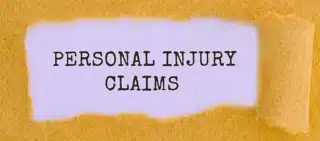
When a Dog Attacks Again and Again If dogs attack once, it’s alarming. When they attack five times, it’s no...


Does a personal injury claim survive death? A personal injury claim in Illinois can continue after death due to the Illinois Survival Act. An individual who suffers an injury can file a claim against the party responsible for their harm. The injured individual can initiate a personal injury lawsuit, which permits them to seek financial compensation for their injuries. Occasionally, a person may pass away before their claim is resolved. The Survival Act enables the deceased’s estate to pursue civil actions, including personal injury lawsuits, that the deceased would have had the right to pursue if they had lived.
If you have lost a loved one while they were pursuing a personal injury claim, contact Strong Law Offices at (309) 688-5297.

If an individual dies while pursuing a personal injury claim in Illinois, the Illinois Survival Act permits the deceased person's estate to continue with the claim the deceased would have been entitled to pursue had they survived.
A survival action is initiated on behalf of someone who passes away before completing or filing a personal injury lawsuit. Its purpose is to compensate the estate for the losses the deceased individual experienced prior to their death. Essentially, it functions like a personal injury lawsuit that the deceased would have initiated had they lived, and it is pursued on their behalf after their passing.
The Illinois Survival Act serves as a means for the deceased to have their voice and actions recognized following a wrongful death. However, several legal considerations come into play when applying the Illinois Survival Act:
When a victim who is the plaintiff in a personal injury lawsuit passes away, the plaintiff becomes the personal representative of the deceased's estate. This individual is typically designated in the deceased’s will, though a court can appoint someone if there is no will.
The personal representative is responsible for managing the estate of the deceased. Individuals fulfilling this role can be categorized as either executors or administrators. If the deceased left a will, the estate is managed by an executor; if there is no will, it falls to an administrator.
An executor is named in the will by the deceased. In the absence of a will, an administrator is generally nominated by the deceased's family. Both individuals and institutions, such as banks and trust companies, can serve as executors or administrators. It’s important to note that an administrator must reside in Illinois, whereas an executor must be a U.S. resident but does not have to live in Illinois. The court ultimately must approve and appoint each executor or administrator.
The personal representative acts as the legal advocate for the deceased, seeking compensation for any injuries or damages suffered before their death.
The statute of limitations refers to a fixed timeframe within which a person must initiate a lawsuit in civil court. If the individual filing the lawsuit does not adhere to this deadline, the court will dismiss the case. These time limits differ across various states and are also contingent upon the type of lawsuit and the violation involved.
In Illinois, the statute of limitations for most personal injury claims is set at two years from the date of the injury. If individuals do not file their lawsuits within these two years, they forfeit their right to seek legal remedies and compensation for related injuries and damages from the incident.
A Survival action's statute of limitations begins at the same time as a personal injury claim, specifically from the date of the incident or injury. Consequently, the personal representative of the deceased's estate must be vigilant to meet this deadline, as a gap between the incident and the death could leave little time to file the lawsuit if one was not filed before the person passed away. If you are considering when to hire a personal injury lawyer, you should do so as soon as possible to ensure that you do not risk missing this deadline.
One of the most important implications when a person dies during a personal injury claim is how the damages are allocated. If the individual had survived, they would have received the damages directly. However, since a survival claim benefits the deceased for injuries incurred before their death, the proceeds from a survival action are directed to the deceased's estate. Consequently, if there is a will, the proceeds will be distributed according to its terms. If there is no will, the distribution will occur according to the intestate succession laws in Illinois. This situation brings forth additional considerations:
The damages would have originally been awarded to the deceased individual. In a survival action, the estate becomes the recipient of these damages. Ultimately, the damages will be allocated to the beneficiaries named in the will, or to the heirs as per Illinois intestate law, based on whether the deceased left behind a will.
Creditors of a deceased individual can submit claims against the estate. In Illinois, when someone passes away, creditors are typically allowed to file claims against the deceased's estate. Valid claims are settled, and the remaining assets are distributed according to the will or applicable state law. Creditors must submit their claims within a designated timeframe and adhere to the proper filing procedures to obtain payment. As a result, any claims made by creditors will decrease the value of the assets that heirs or beneficiaries will ultimately receive.
A personal injury claim can survive after a person's death if it is filed as a survival action. This enables the estate of the deceased to seek damages that the individual would have been eligible for if they had survived, including costs for medical treatment and lost income that occurred before their passing. Essentially, it allows the personal injury claim to proceed as if the individual was still alive.
The Illinois Survival Act is legislation that permits the estate of an individual who has died because of someone else's negligence or intentional wrongdoing to pursue legal action for compensation regarding damages. This law aims to protect the rights of the deceased and ensure that their estate is compensated for losses or damages stemming from their death.
The main goal of the Illinois Survival Act is to achieve justice for the deceased and their estate. By allowing the estate to initiate a lawsuit, the act holds accountable those at fault. It offers a means for recovering financial losses that occurred due to the death of the individual.
The Survival Act recognizes that a deceased individual had rights that must be protected posthumously. It enables the deceased's estate to uphold these rights, pursuing compensation for damages, suffering, medical costs, and lost income that may have occurred before their passing. Consulting a personal injury lawyer is beneficial to ensure adherence to all required legal processes and to enhance the likelihood of a favorable outcome when pursuing a survival act claim.
The cause of the death is irrelevant to the survival action. Imagine a scenario where a plaintiff slips and falls in a grocery store owned by the defendant. If, a month later, the plaintiff drowns in a pool, the defendant wouldn’t be liable for the drowning and, therefore, could not be held accountable in a wrongful death lawsuit. However, the family could still seek compensation for any losses incurred before the plaintiff's death. Despite the plaintiff's passing, the wrongful nature of the defendant's earlier actions remains unchanged.
Since a survival action is a continuation of a personal injury claim that the victim was pursuing before his or her death, the aspects remain the same:
Survival actions require evidence unique to the claim that survives the claimant. For example, if the survival action involves a personal injury claim from a car accident, the four elements of negligence must be proven:
Establishing these elements will necessitate gathering evidence. This may include photographs, witness statements, reports from accident reconstruction experts, medical records, bills, and other evidence relevant to a personal injury case. Given that the claimant has passed away, available records related to the claim become crucial. Evidence concerning the cause of death of the deceased is not required.
A survival action functions similarly to a personal injury claim that the individual would have pursued on their behalf. The damages sought in a survival action cover the period from the time of the injury until the individual’s death. These damages, therefore, are the same as what the deceased person would have claimed had they survived. The damages may include financial compensation for medical expenses, lost wages, and non-financial damages for Pain and suffering, Emotional distress, and dysfunction, if applicable.
In 2021, the CDC reported 224,935 fatal accidents in the U.S., making accidents the fourth leading cause of death, often leading to wrongful death claims.
Wrongful death claims are distinct because they are not initiated on behalf of the deceased individual. Instead, these claims are pursued by surviving family members when claiming survivor benefits after death for the losses they have incurred due to their loved one's death.
For instance, if you lose your father, who offered both moral and financial support, you could potentially claim wrongful death damages to account for the loss of companionship and guidance, as well as the financial support he provided.
In Illinois, wrongful death claims and survival claims can be made following death and are two of the types of cases personal injury lawyers handle. Although these claims often get conflated, they are fundamentally different. Both arise from the death of an individual caused by another's negligence or intentional conduct, but they serve different purposes.
The deceased's surviving family members file a wrongful death claim. This type of claim seeks compensation for the losses experienced by the family, including loss of companionship, financial support, and emotional suffering. Conversely, a survival claim is filed by the deceased's estate.
One distinction between wrongful death and survival claims in Illinois is the beneficiaries of the compensation awarded in personal injury lawsuits. Damages from a survival claim are distributed to the deceased's estate, while damages from a wrongful death claim are divided among the deceased's children, spouse, and other family members.
Additionally, the method for determining compensation differs between the two claims. Compensation for a survival claim is based on the injuries the deceased endured before passing. In contrast, compensation for a wrongful death claim focuses on the losses suffered by the surviving family after the death of their loved one.
The requirements to prove wrongful death also differ from a survival action. Typically, you need to demonstrate that the defendant’s actions led to your family member's death and that you have incurred losses as a result of this loss in a wrongful death claim. A survival action requires you to establish the components of a personal injury case, which often involves proving negligence.Navigating these claims can be intricate. The emotional toll of losing a loved one often leads family members to abandon pending claims tied to the victim. However, the victim is still entitled to fair compensation for the pain and suffering endured. Although no sum of money or verdict can restore a loved one, it can facilitate healing. Contact us at Strong Law Offices for a personal injury attorney to guide you through the claims process.

When a Dog Attacks Again and Again If dogs attack once, it’s alarming. When they attack five times, it’s no...

Overview of the Personal Injury Claim Process in Illinois No one expects to suffer an injury or get involved in...

Exploring Caps on Damages in Illinois Personal Injury Cases Illinois does not have laws capping damages in successful personal injury...